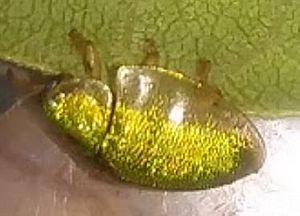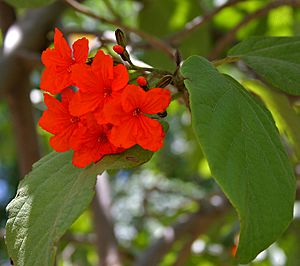Geiger tortoise beetle facts for kids
Quick facts for kids Geiger tortoise beetle |
|
|---|---|
 |
|
| Scientific classification |
|
| Kingdom: | Animalia |
| Phylum: | Arthropoda |
| Class: | Insecta |
| Order: | Coleoptera |
| Family: | Chrysomelidae |
| Genus: | Eurypepla |
| Species: |
E. calochroma
|
| Binomial name | |
| Eurypepla calochroma Blake, 1965
|
|
| Script error: The function "autoWithCaption" does not exist. | |
| Synonyms | |
|
|
Script error: No such module "Check for conflicting parameters".
The Geiger tortoise beetle (scientific name: Eurypepla calochroma) is a special kind of tortoise beetle. You can find it in Florida, parts of Central America, and the Caribbean islands. This beetle has a very specific diet: it only eats the leaves, flowers, and fruit of the Geiger tree (Cordia sebastena) during its entire life.
Contents
About the Geiger Tortoise Beetle
The Geiger tortoise beetle is quite small, usually about one centimeter long. It goes through different stages as it grows.
Life Stages of the Beetle
- Larvae: These are the young beetles. They look like small, brown, slimy worms. They carry a pile of their own waste on their back, near their abdomen. This might sound strange, but it helps them!
- Pupae: After the larvae stage, the beetle becomes a pupa. It looks like a small, hard shell.
- Adults: When the adult beetle first comes out of the pupa, it is round and yellowish. As it gets older, it changes into a beautiful, shiny green color.
Amazing Color Changes
Mature adult Geiger tortoise beetles can actually change their color! They can shift from their usual green to shades of blue, purple, yellow, or brown. This color change depends on how much light is around them.
Where These Beetles Live
You can find the Geiger tortoise beetle in Southern Florida, from Palm Beach to Miami-Dade and Monroe Counties. They also live in the Bahamas and other smaller Caribbean islands, as well as Central America.
These beetles live wherever Geiger trees (Cordia sebastena) grow. This includes open woodlands, grasslands, wetlands, and even gardens.
How Geiger Tortoise Beetles Behave
Larvae Behavior
Young Geiger tortoise beetles, called larvae, have a clever way to protect themselves. They hold their pile of waste, called a "fecal shield," up towards anything that might try to eat them. This shield acts like a tiny umbrella, protecting their soft bodies. Larvae eat the leaves, fruit, and flowers of the Geiger tree.
Adult Behavior
Adult beetles also eat the leaves, fruit, and flowers of the Geiger tree. They spend their lives crawling around on these trees and often fly from one tree to another. When they want to rest or sleep, they often hide under the leaves. Their green color helps them blend in perfectly, which is a type of camouflage.
Scientists have even studied some interesting behaviors of these beetles. If a predator tries to attack them, they can vibrate their heads very fast against a part of their neck. This makes a buzzing noise that can scare away the predator!
 | James B. Knighten |
 | Azellia White |
 | Willa Brown |


